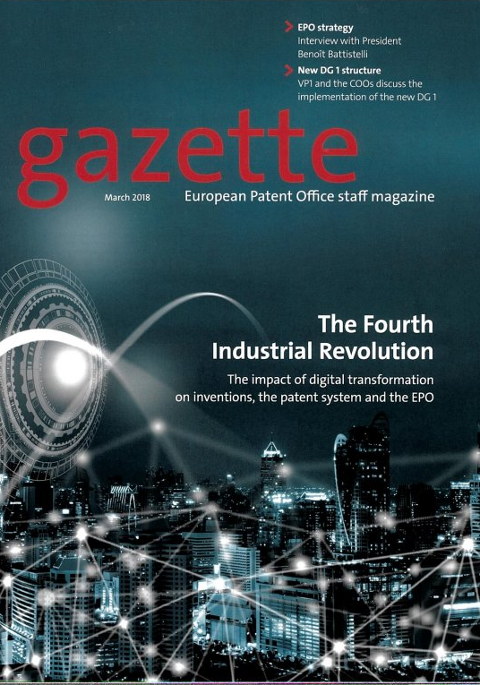

"Some sites are against patents altogether, but we're not among them."As we noted the other day, there's this new example of patents being used to reach a deal over patents. These are not software patents and IPPro Patents makes is sound like an amicable agreement rather than a lawsuit or even a threat of lawsuit.
Global Graphics Software is licensing three patents covering inventions by Mitchell Bogart, the inventor and managing member of Rampage LLC.
The company plans to utilise the methods alongside its own software solutions for inkjet and to pass on the benefits exclusively to its original equipment manufacturer (OEM) customers.
The three patents are US patent numbers. 9,053,410, 9,734,440, and 9,278,566, which cover the Quantone processing methods of screening and compensation for multiple gray-level digital presses and automatic print head registration.
"Only crazy patent fans who make a living from an overabundance of patents (irrespective of their quality) actually keep track of the number and salivate over US patent number 10 million. That's IAM anyway."Given the low quality of IAM's own reporting (accuracy/fact-checking) or even the utter lack of objectiveness at this patent trolls' megaphone, what makes us think/believe they don’t also fabricate so-called ‘benchmarks’ and surveys? It seems like what they call "quality" has nothing whatsoever to do with the quality of patents; it's about how many patents are granted and how quickly (known as "timeliness").
The above post, titled "Celebrating US patent number 10,000,000," is similar to many posts we saw before (this one is from Timothy Au, who several times earlier this month acted as Battistelli's agent of Big Lies, namely the "quality" lie). The number of patents or mere quantity (lawsuits, patents) does not indicate level of innovation but of friction. Only crazy patent fans who make a living from an overabundance of patents (irrespective of their quality) actually keep track of the number and salivate over US patent number 10 million. That's IAM anyway. Each newly-granted patent is another potential lawsuit (or several). Lawsuits are only/mostly fun for lawyers.
Having just finished an anti-€§ 101 lobbying event in the United States, IAM must be very proud of itself (Microsoft was AI-washing software patents in there). It helped crooked Benoît Battistelli and Andrei Iancu. They're both patent maximalists. A press release has just been issued by the USPTO to say:
The United States Patent and Trademark Office (USPTO) hosted the annual meeting of the heads of the world’s five largest intellectual property offices, commonly referred to as the IP5. In addition to the USPTO, the members of the IP5 include the European Patent Office (EPO), the Japan Patent Office (JPO), the Korean Intellectual Property Office (KIPO), and the State Intellectual Property Office of the People's Republic of China (SIPO). Together, the five offices handle approximately 80 percent of the world’s patent applications.
"More buzzwords like "fintech" (similar to "blockchain" in the contextual sense) are nowadays appearing as a pretext for software patenting."And from the press release (as above) "In addition to USPTO Director Iancu, meeting participants included Benoît Battistelli, President of the EPO [...] The impact of Artificial Intelligence (AI) on the patent system was identified as one of the main IP5 strategic priorities to be the subject of common reflection."
Dennis Crouch soon amplified this as well. Over the past month we wrote quite a few articles about this "AI" hype, which the EPO dedicated a whole pro-software patents event to. The EPO also uses terms like ICT, CII, and 4IR. It's almost always about software.
More buzzwords like "fintech" (similar to "blockchain" in the contextual sense) are nowadays appearing as a pretext for software patenting. Here's Tech Wire Asia on Singapore, having published this article only hours ago. Mind this part, which speaks more explicitly about software:
How Singapore’s fast-track patents will help fintech innovations
[...]
Unlike copyright, which in the case of software protects the code itself, patents protect the concept or functionality available on the software.
This means that a third party who replicate a similar function, even if using a totally different set of code, would be in violation of your patent. Patents tend to last for 20 years from the date of filing.
For businesses, this is crucial for distinguishing your offerings from others. If you are selling a piece of software or a service with a particularly unique feature, patents prevent other companies from copying it.
"The EPO needs to watch out because large law firms are noticing the decline in patent quality (no matter what lies IAM is disseminating for Battistelli). They argue that this may result in significant decline in applications, necessitating layoffs and further fee reductions (to spur if not fake 'demand')."We recently wrote about Qualcomm's dubious patents, European Patents from the EPO included, as we noted earlier this month and last month [1, 2]. Josh Landau from the CCIA says* that the ITC might soon get involved and he notes that "Qualcomm has already dropped several patents from this case and in a companion European case admitted that some of its patents are of questionable validity."
The EPO needs to watch out because large law firms are noticing the decline in patent quality (no matter what lies IAM is disseminating for Battistelli). They argue that this may result in significant decline in applications, necessitating layoffs and further fee reductions (to spur if not fake 'demand'). ⬆
____
* Landau's new post may be the subject of later reporting as it involves antitrust aspects too. To quote: "The first Apple/Qualcomm International Trade Commission (ITC) case is about to kick into high gear, with the prehearing conference scheduled for Friday and the hearing (essentially the equivalent of a trial in the ITC) opening next week. Qualcomm has already dropped several patents from this case and in a companion European case admitted that some of its patents are of questionable validity. Setting aside the merits of the patents in the ITC case, why is Qualcomm using the ITC as part of their litigation strategy?"